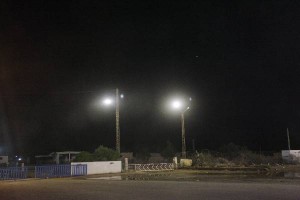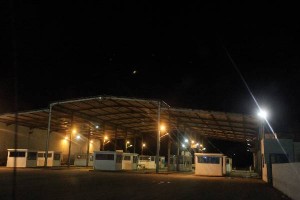The day we arrived in Tunisia an unemployed man set himself alight in protest against the lack of opportunities in the country. A few days after we arrived, we were at a desert festival in the southern town of Douz where the President, Ben Ali, made an impressive appearance. Little did we know that less than 3 weeks later, he (and us) would be making a swift exit from the country as events snowballed into mass popular protest against the regime. He probably didn’t either.
We had been circling Tunisia while we waited for our Libyan transit visa which took three and a half weeks – longer than the two weeks we had envisaged. Having exhausted the main tourist sights, we ambled along to smaller places like Mahdia, on the coast. We watched nervously as the news of protests increased, and when the protester who had self-immolated, died, an eerie calm prevailed for a day – but the touch paper had been lit.
The visa finally arrived and we drove up to Tunis the next morning to collect it, avoiding the night curfew that had been imposed earlier that day following rioting in the city. However, little did we know that the big man at the embassy with the little rubber stamp, was out. We were faced with spending another night in Tunis and could see the shops and cafes had started to close down early for the day.
We had, in a moment of what would retrospectively look somewhat ill-judged, decided to spend the afternoon in Carthage, where the Presidential palace set on a hill overlooks the famous ruins. Not surprisingly, we had the place to ourselves. As we entered the site, we were approached by two casually dressed men, who we brushed off thinking they were guides. Not so – announced the plain clothes contingent of the presidential guard. Still, keen to maintain an air of normality to tourists, they waived us on. Further on, more overt military presence in the form of heavily armed security men politely asked us not to photograph, but still allowed us to proceed.
We could sense things were getting worse that evening. People were scurrying home with a hoard of baguettes and cartons of eggs. Groups of men gathered in cafes but weren’t drinking coffee. Restaurants were packing up chairs that would usually be left outside. The night was spent in a nearby hotel waiting out the curfew which began at 8pm. From our beds we could hear people shouting and car horns blaring. We were told the following day that they were in fact the President’s supporters, happy at some concessions he had announced the previous evening. However, we were to find out that for the majority, this was not enough.
The next morning we had entered a different Tunisia. The usual throng of people lazily waiting by the road side had been replaced by emptiness, with the exception of armoured vehicles and groups of soldiers patrolling the streets. We drove into an empty Tunis and a couple of hours later were in possession of the Libyan visas. Realising that the situation on the streets was getting worse – there had been reports of deaths and sporadic gunfire – we hit the highway south to the border with a sense of urgency. The enduring memory we would have of Tunis would be one of passing the mass protest on the main avenue as we left town.
We had thought about breaking up the journey en route to the border, but as we saw more army blocks on the streets, deserted villages, we knew we had to head for the border that evening. A state of emergency had just been announced.
As we drove through deserted village after village, the usual police checks were unmanned. At the village of Mareth, a throng of people had surrounded the local police station. By the time we got to the final village before the border, we had been driving for an hour in darkness without seeing a soul. The village of Ben Guerdane greeted us with a large roll of barbed wire across its entrance and the army in full force. After explaining our plan to get to the border we were allowed through and told to proceed slowly due to further checkpoints. As we entered the village it was clear that there had been rioting earlier – burnt out car wrecks littered the street. We proceeded slowly, eyeing nervously the sides of the street. Out on the other side, we drove on, and to our relief, we could soon make out the bright floodlights of the border post. We arrived just in time for the 8pm curfew, after an 8 hour and 375mile sprint from Tunis.
In case the border was forced to close due to events unfolding behind, we decided to clear it without delay. However, given that we were taking a vehicle across into Libya, the extra 2 hours of paperwork on the Libyan side could only be completed at daybreak. Thus, we ended up spending the night camped out in the short stretch of no-man’s land between the borders. As we turned in for the night, we checked the BBC website once more, only to learn that the president had been deposed and had fled the country, and renewed violence had flared across the country.
The next morning we would enter Libya, and breath a sigh of relief.
For better or for worse, we had managed to time our visit almost exactly with Tunisia’s one month in the spotlight.


